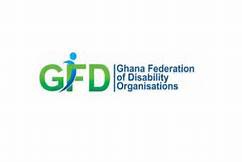 Ghana Federation of Disability Organisations
Ghana Federation of Disability Organisations
Friday, June 23, 2017, marks the National Day of Persons with Disabilities in Ghana. The day is set aside to commemorate the passage of the national disability act which was passed by the parliament of Ghana on 23rd June 2006.
Act 715 seeks to promote and protect the rights of persons with disabilities (PWDs) in Ghana and to ensure their equitable and effective participation and inclusion in the Ghanaian society at all levels.
Since 2009, June 23 has been commemorated annually as national day of persons with disabilities, by the Ghana Federation of Disability organizations (GFD) on various themes.
This year marks eleven years of the passage of Act 715 and one would have expected to see positive change in the lives of persons with disabilities in Ghana.
However, nothing much has been done about implementation of the Act and as such the Act has little positive impact on the lives of persons with disabilities. Public places remain largely inaccessible as evidenced by the N1 road, and the Community Day Senior High Schools.
Also, the transitional provision section 60, known as the ten-year moratorium expired in August 2016 yet no attempt has been made to modify buildings such as government ministries, departments, and agencies, among others, which predated Act 715, to make them accessible and available for use by persons with disabilities. The national standards authority took ten years to develop accessibility standards.
This has provided a haven for individuals and corporate bodies including government entities breaching Act 715 and other legislations and policies intended to promote and protect the rights of persons with disabilities. No reliable and credible disaggregated data on PWDs is available for planning and programming for persons with disabilities. Appointment of persons with disabilities into positions of trust at the national and regional levels is still influenced by discrimination.
Out of one hundred and ten ministers in Ghana only one is a person with disability which is even a step backward from cabinet minister to regional minister. Many persons with disabilities were nominated for metropolitan, municipal and district chief executive positions but only one was successful; all the rest were rejected because of their disabilities.
Healthcare delivery and public transport services are also still not accessible to persons with disabilities. Persons with hearing impairment most of the time spend the whole day at health facilities without accessing the services due to communication barriers. Persons with physical disabilities are mostly denied access to ‘trotro’ or are forced to pay for two or more seats for their wheelchairs or guides.
The Federation has expressed serious concerns about the fact that the country’s Disability Act has no provisions for children and women with a disabilities, humanitarian services and political participation among a host of others.
By this release, the Federation is therefore calling on the Government of Ghana to expedite action on a review of the Persons with Disability Act (Act 715, 2006) to comply with the United Nation Convention on the Rights of Persons with Disabilities and be able to address all critical issues affecting Persons with disabilities, ensure its effective implementation.
SIGNED
YAW OFORI-DEBRA
NATIONAL PRESIDENT
Email: info@gfdgh.org
Tel: +233-0240-867200